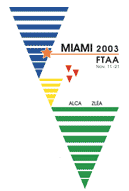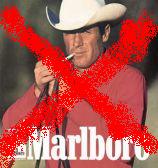 |
OPEN
LETTER FROM
PUBLIC HEALTH ADVOCATES TO FTAA DELEGATES RE: TOBACCO & TRADE |
 |
November 18, 2003
Dear Delegates to the FTAA Ministerial:
We are writing to urge you to exclude tobacco products from the Free Trade Area of the Americas (FTAA), which you will be negotiating November 20-21, 2003 in Miami, FL.
Tobacco is a product like no other, in that it kills if used as intended. According to the Pan American Health Organization, tobacco already kills more than a million people a year in the Americas, including 440,000 deaths in the U.S. alone. If we care about the health and well-being of people throughout the region, we must recognize the unique and deadly nature of tobacco and treat it differently than we do other commodities.
Failure to exclude tobacco from the FTAA would give multinational tobacco corporations a variety of means to threaten sound tobacco control policies throughout the Americas. For example, tobacco corporations might invoke intellectual property protections to oppose bans on the use of misleading descriptors like "mild" and "light," alleging that such prohibitions interfere with trademark-protected names that include such terms; contest the strengthening of health warnings, arguing that they infringe upon trademark rights; and challenge ingredient disclosure laws, claiming a violation of trade secret protections - all arguments they have made under other trade agreements, including the North American Free Trade Agreement (NAFTA).
The service agreements may conflict with efforts to restrict tobacco product retail distribution networks and limit tobacco advertising and marketing.
Most worrisome are foreign investment protections. Investment protections of the type included in NAFTA would give companies such as Philip Morris, BAT and Japan Tobacco standing to directly challenge national and sub-national laws that they claim are tantamount to an expropriation of their property. Under NAFTA, such claims may be made on broad grounds. Philip Morris has already suggested that a Canadian ban on "light" and "mild" would be tantamount to an expropriation of its trademark on products such as Benson & Hedges Lights and Rothmans Extra Light. The mere prospect of such challenges to tobacco control laws may deter countries from adopting sound public health measures, leading to countless, preventable deaths.
There is no legitimate rationale for including tobacco products - a lethal good - in trade agreements. We urge you to work to avert these potential harms to public health by advocating the exclusion of tobacco products from the scope of the FTAA.
Sincerely,
ARGENTINA
• Grupo
Anti-Tabaquismo del Hospital Italiano de Buenos Aires (GRANTAHI)
CANADA
• Non-Smokers' Rights Association
• Physicians for a Smoke-Free Canada
CHILE
• Comisión de Tabaquismo Sociedad Chilena de Enfermedades
Respiratorias
• Fundación CIPRESS
• Programa de Control del Tabaquismo Instituto Nacional del Tórax
COLOMBIA
• Consumidores Colombia (COCO)
• Liga Colombiana contra el Cancer
HONDURAS
• Comision Nacional sobre Control del Tabaquismo (CONACTA)
MEXICO
• Centro de Prevención y Rehabilitación de Enfermedades
Pulmonares Crónicas (CEPREP)
• Consejo Nacional contra las Addiciones
•
Fundación Fomento de Desarrollo, Teresa de Jesus, I.A.P.
• La Inicitiva de Salud Fronteriza Mexicali/Imperial
• Instituto de Física de la UNAM
• Programa Amigo
PERU
• Comisión Nacional Permanente de Lucha Antitabaquica del
Perú (COLAT-PERU)
SURINAME
• Romano Foundation Suriname
TRINIDAD
AND TOBAGO
• Coalition for Tobacco-Free Trinidad and Tobago
UNITED
STATES
• American Cancer Association
• American Heart Association
• American Lung Association
• Campaign for Tobacco Free Kids
• Council for Responsible Public Investment
• Essential Action
• Global Exchange
• Infact
URUGUAY
• Sindicato Médico del Uruguay
• Observatorio Nacional para el estudio de la Epidemia de Tabaquismo
(ONET)